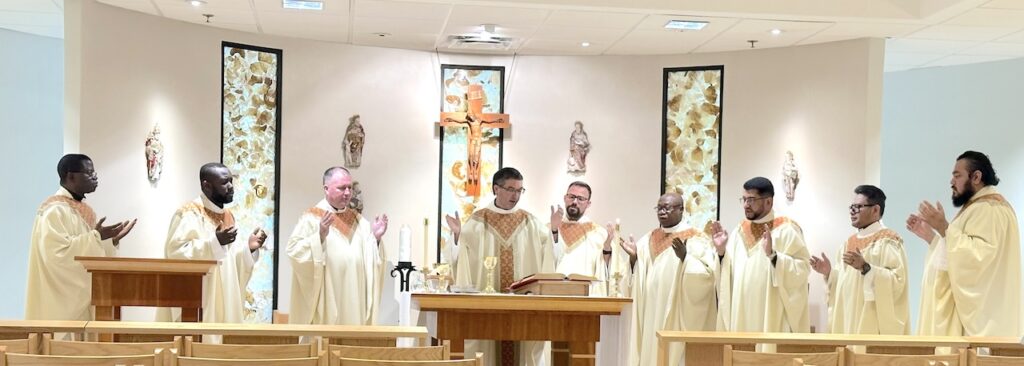Bishop Barry C. Knestout has named nine priests as administrators this fiscal year. To support them in their new roles, administrators spent two days in orientation at the Pastoral Center, Richmond, July 30-31.
“They already have the gifts of being priests,” said Father Timothy M. Kuhneman, vicar for clergy. “Being an administrator means the added responsibility of handling the administration of the parish. That’s why we want to support them in this added layer of priesthood.”
The orientation last month was a way to help prepare the priests for the administrative duties of shepherding parishes, explained Father Kuhneman.
Being an administrator gives priests the opportunity to learn the responsibilities of being a pastor. The main difference between administrators and pastors is that administrators are asked not to start any new initiatives, such as opening a parochial school.
“Administrators have the same responsibilities to the people – the same spiritual, sacramental, and pastoral needs,” the vicar noted, but added that they are also now managing parish finances, overseeing staff, and making sure the church and grounds are maintained.
“Maybe they never had to deal with a leaky roof, or managing a staff – so how do we help them with that?” Father Kuhneman said, as he explained the purpose of the orientation.
During the session, the new administrators were introduced to different staff members at the Pastoral Center who can help in areas such as human resources, finances and fundraising, parish property care, and canonical needs.
“We want to give them information, but more importantly, we want to introduce them to people at the diocesan level who can assist them in their roles,” said Father Kuhneman.
“The hope is that we can foster those relationships so they know who they can come to for help,” he added. “That way, they don’t feel like they have to do everything alone.”
Father Godfred Appiah-Marfo, administrator of St. Mary of the Annunciation, Ladysmith, called the orientation an “eye opener.” He has served the last year as a judge in the diocesan tribunal, and said the orientation helped him combine his canonical knowledge with the practical duties of parish administration.
Father Emmanuel Appah, administrator of Good Shepherd, Lebanon; St. Mary, Coeburn; and St. Therese, in St. Paul, said the orientation was fruitful.
He said it was reassuring to know “that we have a whole team of people ready and willing to help and assist us” and also that “we are not alone in this new responsibility entrusted to us.”
“We may have all the skills, but without the needed tools, we cannot work effectively,” Father Appah said. “The orientation gave me the basic tools I need.”
Both men are cheerful in their outlooks as they assume their new roles. Father Appiah-Marfo said, “Life itself is a challenge, and each day, you wake up to solve issues … but only in Christ will I depend and trust.”
He also quoted Philippians 4:13: “I have the strength for everything through him who empowers me.”
Father Kuhneman recalled being in their shoes as a young priest. He remembered that during his first few weeks as an administrator, a problem in an electrical room popped up.
“It’s a ministry of itself,” he said, because being an administrator means being a good steward and a good shepherd.
“Fixing an electrical room or a crumbling sidewalk may not seem like priestly ministry,” said the vicar, “but it is good stewardship of the people’s money, and keeping them safe when they go to Mass.”
Father Kuhneman has the same advice for all priests, whether they are parochial vicars, administrators, or pastors: “Have a real servant’s heart. Love God, love your neighbor, be present to the people, and be faithful to the priestly calling of service.”

